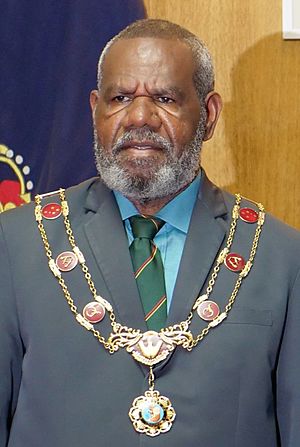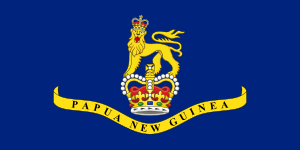Governor-General of Papua New Guinea facts for kids
Quick facts for kids Governor-General of Papua New Guinea |
|
|---|---|

|
|

Emblem of Papua New Guinea
|
|
| Viceroy | |
| Style | His Excellency Grand Chief |
| Residence | Government House, Port Moresby |
| Appointer | Monarch of Papua New Guinea
on the nomination by the National Parliament
|
| Term length | Six years, renewable once (at parliamentary discretion) |
| Constituting instrument | Constitution of Papua New Guinea |
| Formation | 16 September 1975 |
| First holder | John Guise |
The Governor-General of Papua New Guinea is a very important person in the country. They represent the King of Papua New Guinea, who is currently King Charles III. The Governor-General is chosen by the Parliament and then officially appointed by the King.
Their job involves many duties. They appoint important people like government ministers, judges, and ambassadors. They also help start elections. The Governor-General follows a system called the Westminster system. This means they stay politically neutral and always act on the advice of the Prime Minister.
The Governor-General also has a special role in ceremonies. They host events at their official home, Government House, in the capital city of Port Moresby. They also give out special awards to people who have done great things for their communities. When the Governor-General travels to other countries, they represent Papua New Guinea and its King.
Governors-General serve for six years. Since February 28, 2017, Sir Bob Dadae has been the Governor-General. The position was created on September 16, 1975, when Papua New Guinea became an independent country. Since then, 10 people have held this important role.
Contents
How the Governor-General Is Chosen
Unlike in many other countries that have a King or Queen, Papua New Guinea chooses its Governor-General in a special way. The country's Parliament nominates the person. This is different from other places where the Prime Minister usually suggests someone.
The Parliament votes, and the person with the most votes is then appointed by the King of Papua New Guinea. This process is set out in the country's Constitution.
Term Length and Reappointment
A Governor-General serves for six years. If they want to serve a second term, two-thirds of the Parliament must agree. No one can serve more than two terms. Most Governors-General who have retired have received a special honour called a knighthood.
What Happens if the Office Is Empty?
If the Governor-General's office becomes empty, for example, if they pass away or are removed, the Speaker of the National Parliament takes over temporarily. They act as Governor-General until a new one is chosen. If the Speaker's position is also empty, then the Chief Justice steps in.
Removing a Governor-General
The Governor-General can be removed from office. This can happen if the National Executive Council decides it, or if most members of the National Parliament vote for it.
No Governor-General has ever been officially removed. However, in 1991, Sir Vincent Serei Eri resigned. This happened after the Prime Minister suggested to the Queen that he should be removed.
What the Governor-General Does
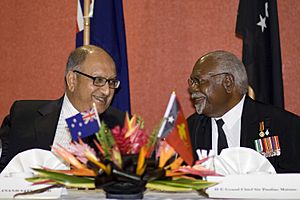
Papua New Guinea shares its King with 14 other countries in the Commonwealth of Nations. Since the King lives outside Papua New Guinea, the Governor-General's main job is to carry out the King's duties. They do this on behalf of the King and in his name.
The powers and roles of the Governor-General come from the Constitution of Papua New Guinea.
Constitutional Duties
The Governor-General has important duties related to the government:
- They officially close Parliament sessions and announce new elections.
- After an election, they ask the leader of the winning party to form a government.
- They officially appoint the Prime Minister and other ministers.
- They approve new rules and laws suggested by government ministers.
- They appoint judges, ambassadors to other countries, and other senior government officials.
- They can also start special investigations called Royal Commissions of Inquiry.
- They approve many other decisions made by ministers, like agreeing to treaties with foreign governments.
Sometimes, the Governor-General can make decisions without or even against the advice of ministers. These are called "reserve powers." They include:
- Choosing a Prime Minister if no party wins a clear majority in an election.
- Removing a Prime Minister who has lost the support of Parliament.
- Removing any minister who is breaking the law.
- Refusing a Prime Minister's request to close Parliament.
Ceremonial Duties
The Governor-General's ceremonial jobs include:
- Opening new sessions of Parliament.
- Welcoming leaders from other countries.
- Receiving official papers from foreign diplomats.
- As the head of the Papua New Guinea Defence Force, they attend military parades.
- They also present awards to people who have shown great service or bravery.
Community Involvement
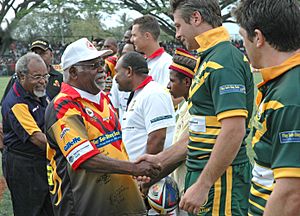
The Governor-General also plays a big role in the community. They lead without taking sides in politics. They support many charities, sports groups, and cultural organizations.
They also help bring Papua New Guineans together by:
- Visiting different parts of the country, including cities and rural areas.
- Becoming a patron for many national organizations.
- Opening and taking part in conferences about important topics like health or education.
- Attending local events and encouraging people who are helping their communities.
- Sending congratulatory messages to people celebrating big milestones, like 100th birthdays.
Special Honours and Symbols
The Governor-General is the head of the Orders of Papua New Guinea. This means they are given the special title of "Grand Chief."
The Governor-General's Flag
The Governor-General has their own special flag. It is blue and features a lion and a crown, with "Papua New Guinea" written below. This flag is flown on buildings to show when the Governor-General is present.
Official Home
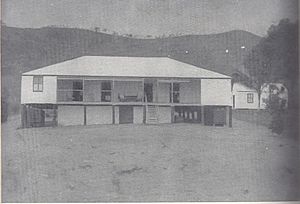
Government House in Port Moresby is the official home of the Governor-General. The location for Government House was chosen way back in 1885. A new building was constructed in 1913.
List of Governors-General
Here is a list of the people who have served as Governor-General of Papua New Guinea since the country became independent in 1975.
Symbols
- Died in office.
Denotes Acting Governors-General
| No. | Portrait | Name (Birth–Death) |
Term of office | Monarch (Reign) |
||
|---|---|---|---|---|---|---|
| Took office | Left office | Time in office | ||||
| 1 | Sir John Guise (1914–1991) |
16 September 1975 |
1 March 1977 |
1 year, 166 days |  Elizabeth II (1975–2022) |
|
| 2 | Sir Tore Lokoloko (1930–2013) |
1 March 1977 |
1 March 1983 |
6 years | ||
| 3 | Sir Kingsford Dibela (1932–2002) |
1 March 1983 |
1 March 1989 |
6 years | ||
| 4 | Sir Ignatius Kilage (1941–1989) |
1 March 1989 |
31 December 1989 |
305 days | ||
| – | Dennis Young (1936–2008) |
31 December 1989 |
27 February 1990 |
58 days | ||
| 5 | Sir Vincent Eri (1936–1993) |
27 February 1990 |
4 October 1991 |
1 year, 219 days | ||
| – | Dennis Young (1936–2008) |
4 October 1991 |
18 November 1991 |
45 days | ||
| 6 | Sir Wiwa Korowi (born 1948) |
18 November 1991 |
20 November 1997 |
6 years, 2 days | ||
| 7 | Sir Silas Atopare (1951–2021) |
20 November 1997 |
20 November 2003 |
6 years | ||
| – |  |
Bill Skate (1953–2006) |
21 November 2003 |
28 May 2004 |
189 days | |
| – | Jeffery Nape (1964–2016) |
28 May 2004 |
29 June 2004 |
32 days | ||
| 8 |  |
Sir Paulias Matane (1931–2021) |
29 June 2004 |
13 December 2010 |
6 years, 167 days | |
| – | Jeffery Nape (1964–2016) |
13 December 2010 |
25 February 2011 |
74 days | ||
| 9 |  |
Sir Michael Ogio (1942–2017) |
25 February 2011 |
18 February 2017 |
5 years, 359 days | |
| – |  |
Theo Zurenuoc (born 1965) |
18 February 2017 |
28 February 2017 |
10 days | |
| 10 |  |
Sir Bob Dadae (born 1961) |
28 February 2017 |
Incumbent | 9 years, 0 days | |
 Charles III (2022–present) |
||||||
See also
 In Spanish: Gobernador general de Papúa Nueva Guinea para niños
In Spanish: Gobernador general de Papúa Nueva Guinea para niños
- List of colonial governors of Papua New Guinea#Papua New Guinea
 | Anna J. Cooper |
 | Mary McLeod Bethune |
 | Lillie Mae Bradford |


